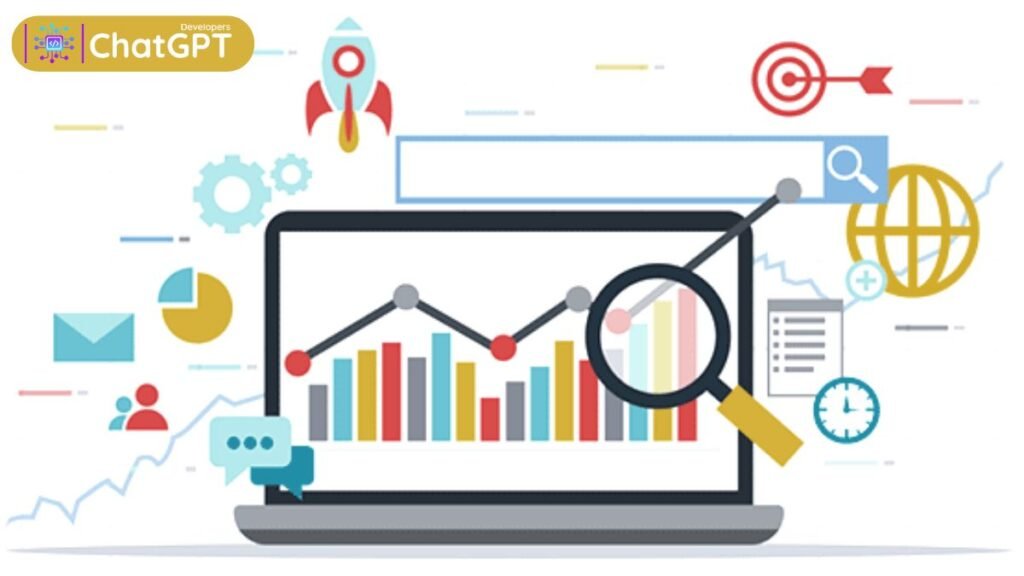In the ever-evolving world of artificial intelligence, developers of chatgpt Working with models like ChatGPT need robust analytics and reporting tools to optimize performance, track usage, and derive meaningful insights. As the complexity of AI applications increases, so does the need for sophisticated tools that can handle vast amounts of data and provide actionable insights. Here, we present the top 10 analytics and reporting tools that are essential for developers of ChatGPT.

1. Google Analytics For Developers of ChatgptOverview:
Google Analytics is a powerful tool for tracking user interactions and engagement. For developers of chatgPT, it can provide insights into how users interact with the AI, helping to optimize user experience and improve performance.
Key Features:
- Real-time data monitoring
- User behavior analysis
- Conversion tracking
- Customizable reports
Why Use It:
With Google Analytics, developers of chatgpt may gain a detailed understanding of user engagement, which helps the finding of areas for development and the evaluation of changes’ impact.
2. Mixpanel
Overview:
Mixpanel is a great option for developers that want to know how users take part with their ChatGPT applications because of its focus on user behavior analytics.
Key Features:
- Event tracking
- Funnel analysis
- Cohort analysis
- Retention tracking
Why Use It:
Developers can enhance their applications by using Mixpanel’s detailed user behavior reports, which offer insights into user behavior and interaction patterns.
3. Amplitude
Overview:
A complete product analytics solution, Amplitude offers deep understanding into user behavior and product performance.
Key Features:
- Behavioral cohort analysis
- Real-time analytics
- User journey mapping
- A/B testing support
Why Use It:
By providing an extensive overview of user interactions and allowing data-driven decision-making to improve user experience, Amplitude supports ChatGPT developers.
4. Kibana
Overview:
Kibana, part of the Elastic Stack, is a visualization tool that allows developers to analyze and visualize data from Elasticsearch.
Key Features:
- Interactive data exploration
- Real-time monitoring
- Customizable dashboards
- Advanced filtering
Why Use It:
Kibana’s powerful visualization capabilities make it easier for developers to identify trends and anomalies in their data, providing a clear path to optimization.
5. Tableau
Overview:
Tableau is a leading data visualization tool that helps developers create interactive and shareable dashboards.
Key Features:
- Drag-and-drop interface
- Extensive data connectivity
- Real-time data collaboration
- Advanced analytics
Why Use It:
Developers may communicate findings more effectively by converting complex data into understandable graphs with Tableau’s broad capabilities and intuitive interface.
6. Power BI
Overview:
Microsoft Power BI is a business analytics service that open ai and chatgpt delivers insights through interactive dashboards and reports.
Key Features:
- Data modeling
- Custom visualizations
- Real-time streaming
- AI-driven analytics
Why Use It:
Because Power BI easily connects with other Microsoft products, developers working in the world of Microsoft can use it as a powerful tool for analyzing and visualizing ChatGPT data.
7. Looker
Overview:
Looker, now part of Google Cloud, is a data analytics platform that simplifies data exploration and business intelligence.
Key Features:
- SQL-based modeling
- Custom dashboards
- Data integration
- Embedded analytics
Why Use It:
Looker’s robust data modeling capabilities help developers create detailed and customizable reports, allowing for better data-driven decisions.
8. Datadog
Overview:
A system for analytics and monitoring called Data Dog offers thorough insight into infrastructure and applications.
Key Features:
- Infrastructure monitoring
- Application performance monitoring (APM)
- Log management
- Real-time alerts
Why Use It:
Datadog’s extensive monitoring capabilities help developers ensure their open ai and chatgpt applications are running smoothly and efficiently, with real-time alerts for any issues.
9. New Relic
Overview:
New Relic provides full-stack observability, allowing developers to monitor the performance of their applications and infrastructure.
Key Features:
- Application performance monitoring
- Infrastructure monitoring
- Real-time analytics
- Customizable dashboards
Why Use It:
New Relic’s comprehensive monitoring and analytics features help developers maintain optimal performance of their ChatGPT applications, ensuring a seamless user experience.
10. Apache Superset
Overview:
Big databases can be handled via the open-source research and visualization tool Apache Superset.
Key Features:
- Interactive dashboards
- SQL-based querying
- Customizable visualizations
- Real-time data exploration
Why Use It:
For developers seeking a free and flexible analytics tool, Apache Superset offers powerful features for exploring and visualizing data from ChatGPT applications.
For any Digital Marketing services in India click here
Conclusion
For developers working with ChatGPT, choosing the right analytics and reporting tools is crucial for optimizing performance and enhancing user experience. The tools listed above provide a range of features to help developers of chatgpt monitor, analyze, and visualize data effectively. By leveraging these tools, developers can gain deeper insights into user behavior, identify areas for improvement, and ultimately create more efficient and engaging AI applications.
